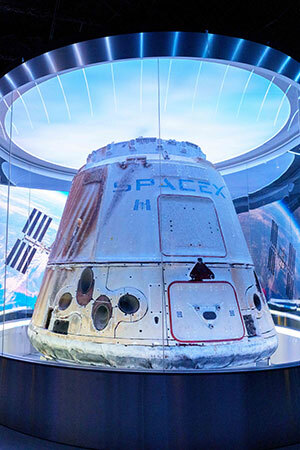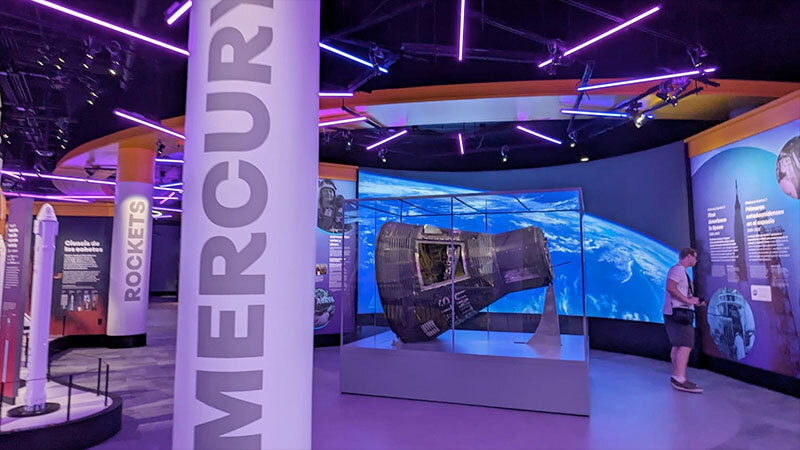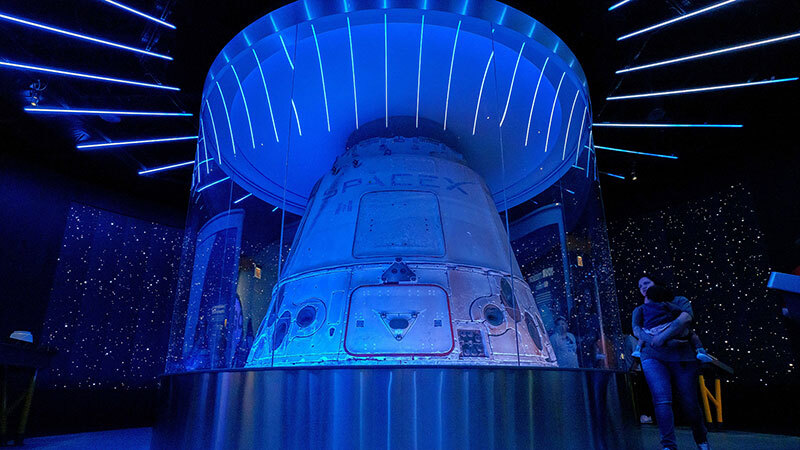A twice-flown SpaceX capsule has debuted on public display next to the second Mercury spacecraft to launch an American into Earth orbit and first Apollo command module to fly astronauts to the moon.
The last first-generation Dragon capsule that SpaceX built to ferry cargo to and from the International Space Station went on exhibit on Sunday (May 19), as part of a renovated gallery at the newly-renamed Griffin Museum of Science and Industry in Chicago. A $125 million donation by hedge fund manager Kenneth C. Griffin — the largest contribution in the museum's history — helped to underwrite refreshing the Henry Crown Space Center, including adding the SpaceX display.
"This is the first major renovation to the Henry Crown Space Center since it opened in 1986," said Voula Saridakis, curator at the Griffin Museum of Science and Industry, in an interview with collectSPACE. "Before this, the gallery was current up until the space shuttle and the crewed and uncrewed missions through the 1990s."
"We have now updated all the content," Saridakis said. "It is still an exhibit about space exploration since the 1950's, but now it emphasizes space exploration from the past 20 to 30 years."
Astronaut Scott Carpenter's 1962 "Aurora 7" Mercury spacecraft and the Apollo 8 command module that flew Frank Borman, Jim Lovell and Bill Anders to the moon in 1968 remain star attractions, but so is now the SpaceX Dragon and other, more recent artifacts added to the gallery.
"When you first walk into the Henry Crown Space Center, that is where we have the Apollo and Mercury and you take in that history," Saridakis said. "Then, as you move towards the back, that is where you see the entry to the Dragon enclosure, go into it and experience the more recent missions, see what they represent and why they are important."
Dragon C113, which was donated by SpaceX and delivered to the museum two years ago, logged 64 days on its two missions to the space station. It was used for the 12th and 17th commercial resupply services (CRS) flights launched under contract for NASA in 2017 and 2019, respectively. Among its deliveries were the Cosmic-Ray Energetics and Mass (CREAM) science instrument and the STP-H6 demo, the latter built to perform the first space-based X-ray band communications.
C113 is the only second Dragon spacecraft to go on permanent public display after another of the first generation capsules at the Kennedy Space Center Visitor Complex in Florida. SpaceX also exhibits a flown Dragon inside its Hawthorne, California headquarters.
As part of the renovation, the Dragon and Apollo 8 were placed in custom-built conical glass cases that surround visitors in the capsules' journeys using lighting effects and video walls.
"We have created these new glass cases for both the Apollo and Dragon that provide 360 [degree] views. Both are backdropped by videos, media pieces that are very immersive, such that you feel like you're actually in space," Saridakis told collectSPACE. "Radial lights extend in line throughout the exhibit and there are also lights inside the cases that work with the backdrop videos as you watch the footage from their launch, time floating through space and reentry."
Other artifacts in the Henry Crown Space Center benefit from new effects as well. "Aurora 7" has its own video wall and an Apollo lunar module test article has been placed into a recreation of its original surroundings.
"It is a fantastic, unique artifact in that it's the only one used by all 12 astronauts [to walk on the moon] to train at the Kennedy Space Center. We reimagined that space so it looks more like the training area, rather than trying to present the lunar module like it was actually on the moon."
Visitors to the Henry Crown Space Center can also now see tools and food used by Apollo-era astronauts and a prototype garment and biofeedback belt worn by Mae Jemison, the first U.S. woman of color to fly into space and a Chicago native.
Saridakis said that she plans for even more to come.
"The Apollo and Mercury are on loan from the Smithsonian's National Air and Space Museum, but we are definitely looking to add more space artifacts to our permanent collection here at the Museum of Science and Industry," she said.
|
|
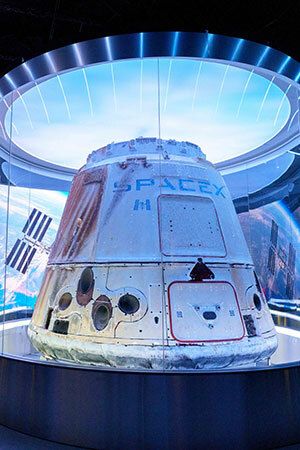
A twice-flown SpaceX Dragon cargo spacecraft is seen on display in the renovated Henry Crown Space Center at the Griffin Museum of Science and Industry in Chicago. (Griffin MSI)
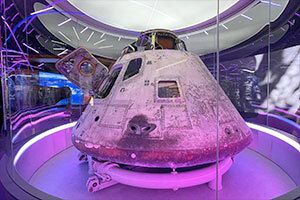
A new glass case, lighting and a video wall immerse visitors in the journey of the Apollo 8 command module in the newly-reopened Henry Crown Space Center at the Griffin Museum of Science and Industry in Chicago. (Cosmic Chicago/Michael Galindo)
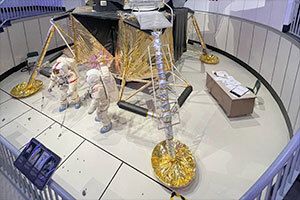
The Griffin Museum of Science and Industry in Chicago recreated the area where Apollo astronauts used this lunar module trainer at NASA's Kennedy Space Center in Florida as part of the renovated Henry Crown Space Center. (Cosmic Chicago/Michael Galindo)
|
